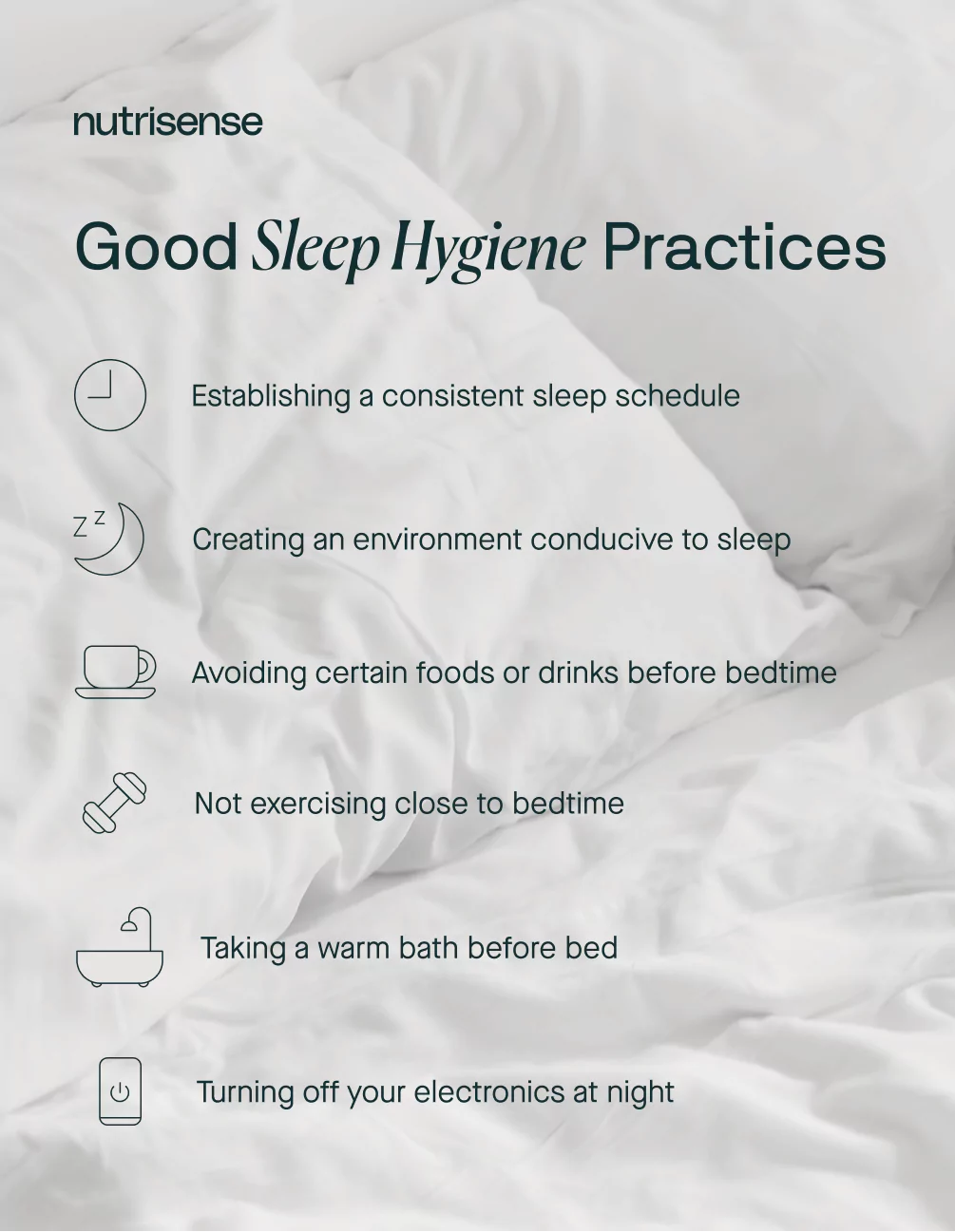What is Poor Sleep Hygiene? Recognizing the Signs and Making Changes

Key Takeaways
We’ve said this before, and we’ll say it again: getting a good night’s sleep is incredibly important for your overall health. But sleep doesn’t come easily for some people, and if you fall into that category, it’s even more important to focus on improving your sleep hygiene.
Organizations like the National Sleep Foundation recommend that adults get between seven to nine hours of sleep per night. But the amount of sleep you get isn’t the only thing that matters, your sleep quality is just as important.
So, how can you make sure you’re getting plenty of good sleep each night? Keep reading to learn more about the health effects of poor sleep hygiene and how you can improve your sleep hygiene.
Defining Sleep Hygiene
Sleep hygiene is a combination of habits, routines, and sleeping conditions that help promote healthy sleep. For people who often have trouble sleeping, sleep hygiene can improve things like your sleep duration, energy levels, mental health, and even quality of life.
Here are a few examples of good sleep hygiene practices:

- Establishing a consistent sleep schedule
- Creating an environment conducive to sleep
- Avoiding certain foods or drinks before bedtime
- Not exercising close to bedtime
- Taking a warm bath before bed
Why Sleep Hygiene is Important
Sleep hygiene encompasses both habits and environmental changes. According to researchers, forming healthy habits can be an important component of staying healthy.
In fact, studies show that repetition of a simple action in a consistent context eventually leads to the action becoming habitual. In the context of sleep hygiene, this suggests that repeating certain simple actions that benefit sleep can create healthy sleep habits that improve your health..
For example, practicing relaxation techniques or meditation before bedtime may lead to consistently better sleep health. On the other side of things, however, repeating actions that harm sleep such as looking at your phone or laptop in bed, may lead to consistently poor sleep quality.
What Does Poor Sleep Hygiene Look Like?

Poor sleep hygiene is a collection of habits and sleeping conditions that interfere with sleep. These may include:
- Using blue light-emitting screens like laptops, tablets, and smartphones before bed, which can suppress melatonin production and increase alertness
- Sleeping in a room that is too hot, as high air temperatures have been shown to interfere with sleep quality
- Taking frequent naps in the daytime, which can interfere with your ability to sleep at night
- Sleeping in a room with excessive background noise, such as loud outside traffic
- An irregular bedtime schedule, or going to sleep and waking up at different times throughout the week
- Drinking caffeinated beverages and/or alcohol before bed, though some people may experience the negative effects on sleep even if consumed earlier in the day
Signs of Poor Sleep Hygiene
Unhealthy sleep patterns can lead to negative health consequences, and in some cases even sleep disorders. Signs of inadequate sleep hygiene can include:

- Increased sleep latency, which is the time it takes you to fall asleep after turning out the lights
- Increased sleep fragmentation, which are repetitive short interruptions in sleep
- Excessive daytime sleepiness, or the inability to stay awake and alert during the daytime
- Insomnia, or having trouble falling asleep or staying asleep
- Decreased cognitive function, such as poor concentration or decreased ability to pay attention
- Increased appetite
Consequences of Poor Sleep Hygiene
Poor sleep hygiene can interfere with your ability to get healthy sleep. Studies have shown that there is a strong connection between getting inadequate sleep and the development of serious health conditions like:
- Hypertension
- Obesity
- Type 2 diabetes
- Cardiovascular disease
- Neurodegenerative disorders like dementia
A lack of sleep can also leave you more susceptible to infection and sickness, and affect how fast you are able to recover if you do get sick.
Sleep deprivation can also affect your psychological well being. Not sleeping enough can have a negative impact on your ability to regulate your emotions, and can lead to increased anxiety, and depression.
Research also shows that sleep loss can result in social isolation and increased feelings of loneliness. Sleep deprivation can also have a negative effect on your brain function, including your attention span, working memory, long-term memory, and decision making.
How to Improve Sleep Hygiene

So, you can see that sleep hygiene is clearly important. But how can you establish good sleep habits? Here are a few ways to improve your bedtime habits and routines.
1) Establish a Consistent Sleep Schedule
As mentioned earlier, an irregular bedtime schedule can interfere with your quality of sleep. Establishing a consistent sleep schedule may benefit your circadian rhythm, which can improve your sleep.
Try setting a consistent time for turning out the lights and getting into bed, and stick to it every day. Waking up at the same time every day, even on weekends, can also help ensure that you stick to your sleep schedule at night.
2) Test Your Tolerance to Stimulants

Avoiding stimulants like caffeine, sugar, and nicotine may be important to sleep hygiene. Studies show that caffeine can disrupt your circadian rhythm and, when taken before bed, reduces melatonin production, which can throw off your sleep.
Some people who are particularly sensitive to these compounds may notice a negative impact on sleep even when consumed earlier in the day. In any case, testing your own personal tolerance by experimenting with different amounts or even a break from caffeine may be insightful.
Nicotine also has a negative effect on sleep: studies show that it can suppress REM sleep, decrease slow wave sleep, and increase sleep latency and sleep fragmentation. Interestingly, studies suggest that a diet high in saturated fat and sugar may lead to lighter, less restorative sleep, with more waking up during the night.
However, more long-term studies are needed on this topic. For more advice on what foods to avoid before sleep, consult with your doctor.
3) Add Relaxation Methods to Your Wind-Down Routine
Adding some simple relaxation techniques to your bedtime routine may help you fall asleep more quickly, and stay asleep longer. Relaxation techniques such as meditation can calm the mind, interrupt thought processes that negatively affect sleep, and reduce physical tension.
4) Prioritize a Sleep-Conducive Environment

Your sleeping environment is a crucial component of good sleep hygiene. Here are some tips for a sleep-conducive environment:
- Try to keep your room at a comfortable temperature. The ideal range for sleep lies somewhere between 60 and 67 degrees Fahrenheit.
- Your body’s circadian rhythm is affected by light and darkness. Avoid bright lights at night, which can interfere with your circadian rhythm.
- A quiet room is crucial for sleep. Try blocking out noise with a fan, white noise machine, or earplugs.
- Put your phone and other electronic devices away at least an hour before bed each night.
5) Improve Your Health Habits During the Day
Healthy habits during the day can have an effect on your sleep at night. Here are a few habits that may affect your sleep:
Appropriate Exercise
Studies show that getting appropriate amounts of regular exercise can benefit total sleep time, sleep latency, sleep efficiency, sleep quality, stage 1 sleep, and slow wave sleep. And remember - more exercise isn’t always better! If you are engaged in activity levels your body isn’t tolerating well or that you aren’t properly fueled for, this may negatively impact sleep just as much as not getting enough exercise.
Dietary Habits

As we mentioned, a low fiber, high-saturated fat, and high-sugar diet is associated with lighter, less restorative sleep. Micronutrient deficiencies, like vitamin B1, folate, magnesium, iron, and zinc deficiencies, have also been associated with sleep problems.
Every person’s dietary needs are unique, and consulting with a qualified primary medical provider and nutrition professionals is the best way to establish a healthy diet for sleep.
Frequent Daytime Napping
An occasional, short nap during the day may not have an effect on your nighttime routine, but according to the Mayo Clinic, long or frequent napping can interfere with your ability to sleep or cause you to wake up frequently through the night.
Other Benefits of Proper Sleep Hygiene

Good sleep hygiene can benefit your health in a number of ways that go beyond your sleep. Here are some possible effects of proper sleep hygiene:
Stronger Immune System
Sleep has a strong regulatory effect on your immune system. For example, getting good sleep can benefit adaptive immunity, which is your body’s ability to respond to foreign substances or microorganisms.
Adaptive immunity involves specialized immune cells and antibodies that identify and destroy these foreign invaders. Research shows that immune cells involved in these activities are activated when you sleep, which can benefit your adaptive immunity.
Increased Energy and Productivity During the Day
Some researchers believe that sleep is critical to replenish energy stores in the brain that have been depleted during the day. Being awake requires a lot of energy from the brain. Restorative sleep has been shown to help rebalance glycogen levels in the brain.
Reduced Stress and Anxiety

Research shows that a lack of sleep can increase anxiety and vice versa. Well, getting good sleep may help reduce anxiety. A 2019 study found that non-rapid eye movement (NREM) slow-wave sleep can reduce anxiety and stress in the brain.
Find the right Nutrisense programto turn insight into progress.
Go Beyond Glucose Data with Nutrisense
Your glucose can significantly impact how your body feels and functions. That’s why stable levels are an important factor in supporting overall wellbeing. But viewing glucose isn't enough. Nutrisense, you’ll be able to learn how to use your body's data to make informed lifestyle choices that support healthy living.
One-to-one coaching
Sign up to access insurance-covered video calls to work with a glucose expert: a personal registered dietitian or certified nutritionist who will help tailor your lifestyle and diet to your goals.
Monitor and measure what matters
With the Nutrisense CGM Program, you can monitor your glucose with health tech like glucose biosensors and continuous glucose monitor (CGM)s, and analyze the trends over time with the Nutrisense App. This will help you make the most informed choices about the foods you consume and their impact on your health.
Find your best fit
Ready to take the first step? Start with our quiz to find the right Nutrisense program to help you take control.

Heather is a Registered and Licensed Dietitian Nutritionist (RDN, LDN), subject matter expert, and technical writer, with a master's degree in nutrition science from Bastyr University. She has a specialty in neuroendocrinology and has been working in the field of nutrition—including nutrition research, education, medical writing, and clinical integrative and functional nutrition—for over 15 years.




